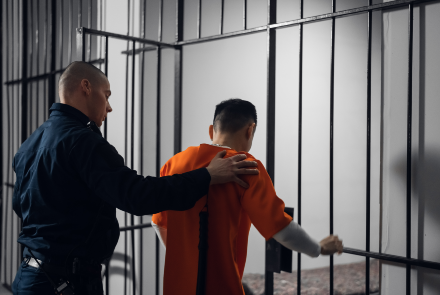
Call Now For A Free Consultation:

Call Now For A Free Consultation:

Sadly, deaths in police custody, in both jails and prisons, still happen today. While natural deaths are sad, there is something particularly tragic from prison deaths that occur because of police misconduct or neglect. You have a right to safety and all necessary medical care while in police custody. Whether you were just arrested or you've been in prison, you or your loved one has rights.
Wrongful death in police custody, both in jail and in prison, is a severe issue. You deserve to work with an attorney who understands your loved one’s rights in police custody and is willing to fight for justice after a death in police custody.
People who are incarcerated or held in any kind of police custody no longer have the ability to care for themselves. Because they cannot seek medical care independently and have restricted rights to protect themselves in other ways, it’s the state’s responsibility to keep incarcerated people safe.
That means the state is responsible for providing adequate medical care for incarcerated people. It means that the state is responsible for keeping incarcerated people safe. It means that the state has a responsibility not to use unnecessary violence against the incarcerated people in its care.
Police officers and jail and prison security guards, who act under the state's authority, share that responsibility.
Unfortunately, the reality is that our jails and prisons often fail to meet these basic standards for the care and protection of incarcerated people. Failure to respond to medical complaints, to protect inmates from other inmates, or even to protect inmates from staff violence can and do result in wrongful deaths.
Deaths from suicide may also be considered wrongful deaths since prisons and jails are responsible for caring for the mental health of their inmates. Responsibility to protect incarcerated persons includes a responsibility to protect them from themselves.
Not only does the state have a responsibility to protect people in its custody, but courts have also ruled time and time again that this responsibility is critical and that lack of funds and other barriers are no excuse for wrongful deaths.
It seems that prison death is becoming more common instead of less. That means more people and families are affected by wrongful prison deaths. Prosecuting these deaths is essential to reforming the system and stopping even more people and families from going through these tragedies.
Unfortunately, family members of loved ones of the diseased can often find it difficult to get information about their loved one after a death in custody. Prison officials and officers may delay the release of information for various reasons, some legitimate and some not.
If your loved one’s death came unexpectedly, or you suspect misconduct may be involved in their death, even if officers weren’t directly involved, it’s essential to contact an attorney immediately. Since the state is responsible for caring for and protecting inmates and anyone in temporary custody, you may have a wrongful death case regardless of officer involvement.
Contacting an attorney quickly if you suspect the wrongful death of a loved one in police custody is critical. Your attorney can help you navigate the legal system to request more information and build a case.
While no court case can bring your loved one back, pursuing justice in your case can help protect others and shed light on weaknesses and failures in our justice system.
All deaths in custody are sad, but wrongful deaths from neglect or violence are particularly tragic. We understand that the time after a wrongful death is challenging and painful and that pursuing a wrongful death case can make that time harder.
At Justin Palmer Law Group, we always aim to do what’s right for you and your case. Many wrongful death cases end in settlements, but we will work to get your case in a courtroom if that's what you want, and we'll always advise you on the best next steps and take your preference into account.
We’re willing to take on complex cases and will fight to ensure you and your loved one get the representation you need.
We also know wrongful death in custody cases can be hard to fight. Our attorneys have the experience you need to present the best possible case to the state and know how to face the challenges of getting your case heard.
The sooner you contact us for your prison death case, the sooner we can get to work gathering information and finding out what kind of case you have. Incarcerated people and people held in police custody still have rights, and it’s important to fight to protect them.
We’ll fight for you and your loved one and work hard to ensure your case gets the legal attention it deserves.
Schedule your free consultation with our legal experts today.
Attorney Advertising | Prior results do not guarantee a similar outcome. The information on this website is for general information purposes only. Nothing on this site should be taken as legal advice for any individual case or situation. This information is not intended to create, and receipt or viewing does not constitute, an attorney-client relationship. This site is protected by reCAPTCHA and the Google Privacy Policy and Terms of Service apply.